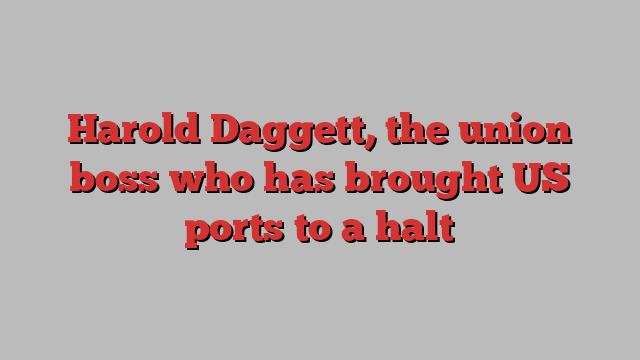
Three weeks ago, Harold Daggett threatened to “cripple” the American economy.
“You have no idea what that means. Nobody does,” Daggett, the president of the International Longshoremen’s Association, said in a video posted to his union’s YouTube channel. He described a scenario in which car salesmen and construction workers are laid off en masse and shopping malls shut down within a matter of weeks.
He began to make good on that promise on Tuesday. The longshoremen do not hold strike authorisation votes, which left Daggett to single-handedly order dockworkers to walk off the job just after midnight. It effectively shut down every port along the US east and gulf coasts and upended global supply chains.
Though the White House sought to reassure the public that the strike’s effects would be limited, JPMorgan analysts estimated each day of the work stoppage could cost the US economy as much as $4.5bn.
In leading the work stoppage, Daggett has positioned himself as the hero in a crusade on behalf of all working-class Americans who fear they may lose their jobs to robots, even as the shipping industry paints him as an unreasonable and wealthy union boss with a history of alleged mob ties. Daggett rejected an offer of a nearly 50 per cent wage increase from the port operators and ocean carriers over fears about automation.
Labour experts say that whatever provisions the longshoremen accept could create a new blueprint for resolving future man-versus-machine battles in other industries. The economic fallout will force the country to “realise how important our jobs are”, he said in the video.
Daggett and his union say the strike is necessary to win higher wages and job security for dock workers whose jobs have been threatened by automation. Without the work stoppage, ILA leaders say the longshoremen’s ranks could be slashed like those of the Detroit autoworkers.
“We will not accept the loss of work and livelihood for our members due to automation,” the union said late on Tuesday. “Our position is clear: the preservation of jobs and historical work functions is non-negotiable.”
But Daggett is also concerned with the use of advanced automation tools on docks throughout the world, and has said he plans to take his campaign global, listing ports in Chile and Portugal among potential targets.
The strike thrusts Daggett, who was little known outside of labour and shipping circles before this week, into the spotlight. Detractors say his union is impeding recovery from Hurricane Helene in devastated parts of North Carolina, Georgia, and Tennessee by halting imports of food and pharmaceuticals.
Others poked fun at a salary and lifestyle they see at odds with Daggett’s working class ethos. The ILA paid Daggett $728,000 last year, according to a Politico analysis of the union’s labour department filings. He reportedly drives a Bentley and once owned a 76-foot yacht.
“Dude had more yachts than me!” wrote Elon Musk on X.
But Daggett seemed prepared for the controversy on Tuesday as he applauded workers for “making history” on the picket line outside the Port of New York and New Jersey.
Daggett and other ILA leaders wore hoodies that read “The docks are ours”.
Daggett, 78, was born in New York and followed his father on to the docks in New Jersey as a mechanic in 1967, after serving in the US Navy during the Vietnam war. He was elected the union’s leader in 2011.
Federal prosecutors suspected his rise within the union’s ranks may have been powered by a connection to organised crime, leading to an indictment on extortion and fraud charges in 2005. Daggett said he actually had been targeted by the mob and was found not guilty.
In another case, prosecutors in Brooklyn called Daggett “an associate of the Genovese family”, one of the so-called “Five Families” of the US mafia.
Daggett often uses colourful language and primarily communicates through Facebook posts and YouTube videos. He called the ocean carriers that collectively employ the longshoremen to load and offload their cargoes “greedy bastard corporations” on Facebook hours before the strike began in a post that the union later republished as an official statement.
Daggett’s confrontational style has earned him the support of some other labour leaders, including the Teamsters’ Sean O’Brien and the International Longshore and Warehouse Union’s Bobby Olvera Jr. But it has also strained his relationship with Joe Biden, the self-proclaimed most pro-union president in history.
“Where is the president of the United States? He’s not fighting for us,” Daggett said in on the union’s YouTube page, criticising the Biden administration’s relief efforts for dock workers displaced by the Baltimore bridge collapse in March.
Daggett has also made overtures to former president Donald Trump, saying the two had a “wonderful, productive 90-minute meeting” on “the threat of automation to American workers” at Trump’s Mar-a-Largo estate in November.
Still, Biden has honoured Daggett’s request to not intercede in the union’s stalled negotiations with United States Maritime Alliance (USMX) over the objections of business leaders.
Despite Daggett’s influence over US trade, he faces substantial obstacles in his battle against automation. American ports use far fewer robotics than their counterparts overseas. Remote-controlled cranes load and unload shipping containers in the Netherlands and Australia.
That has led the efficiency of US terminals to fall behind in the ranking of the world’s top-performing ports, supply chain analysts say, with none ranking in the World Bank’s top 50 slots in 2023.
James Kelly of Moody’s Analytics said: “Though ILA members will probably receive significant wage gains, their efforts to slow or halt technological advancements at ports are likely a losing battle.”
But Daggett has repeatedly pledged to maintain the strike until USMX agrees to a $5 an hour pay increase in addition to “absolute airtight language that there will be no automation or semi-automation”.
The Maritime Alliance on Tuesday said its offer, which includes a nearly 50 per cent wage increase and the extension of the union’s current automation clause, “exceeds every other recent union settlement, while addressing inflation, and recognising the ILA’s hard work to keep the global economy running”.
Analysts say Daggett is unlikely to compromise. Both JPMorgan and Moody’s said they expect the strike to end only after government intervention.
Daggett said: “We are prepared to fight as long as necessary, to stay out on strike for whatever period of time it takes, to get the wages and protections against automation our ILA members deserve.”

